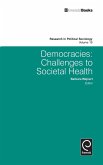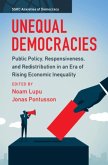Yaron Ezrahi (Hebrew University of Jerusalem)
Imagined Democracies
Yaron Ezrahi (Hebrew University of Jerusalem)
Imagined Democracies
- Broschiertes Buch
- Merkliste
- Auf die Merkliste
- Bewerten Bewerten
- Teilen
- Produkt teilen
- Produkterinnerung
- Produkterinnerung
Ezrahi proposes that publics that lost their faith in extra-human sources of authority during the Enlightenment are now equally skeptical about the role of rational deliberation in politics. In our era of mass electronic communications, political realities are produced by believable fictions that echo popular desires.
Andere Kunden interessierten sich auch für
![The Social Origins of Electoral Participation in Emerging Democracies The Social Origins of Electoral Participation in Emerging Democracies]() Danielle F. Jung (Atlanta Emory University)The Social Origins of Electoral Participation in Emerging Democracies23,99 €
Danielle F. Jung (Atlanta Emory University)The Social Origins of Electoral Participation in Emerging Democracies23,99 €![Might, right, prosperity and consent Might, right, prosperity and consent]() Helen ThompsonMight, right, prosperity and consent35,99 €
Helen ThompsonMight, right, prosperity and consent35,99 €![Democracies Democracies]() Democracies179,99 €
Democracies179,99 €![State Crisis in Fragile Democracies State Crisis in Fragile Democracies]() Samuel Handlin (University of Utah)State Crisis in Fragile Democracies122,99 €
Samuel Handlin (University of Utah)State Crisis in Fragile Democracies122,99 €![Unequal Democracies Unequal Democracies]() Unequal Democracies42,99 €
Unequal Democracies42,99 €![Democracies in Peril Democracies in Peril]() Ida Bastiaens (New York Fordham University)Democracies in Peril23,99 €
Ida Bastiaens (New York Fordham University)Democracies in Peril23,99 €![Why Democracies Develop and Decline Why Democracies Develop and Decline]() Why Democracies Develop and Decline31,99 €
Why Democracies Develop and Decline31,99 €-
-
-
Ezrahi proposes that publics that lost their faith in extra-human sources of authority during the Enlightenment are now equally skeptical about the role of rational deliberation in politics. In our era of mass electronic communications, political realities are produced by believable fictions that echo popular desires.
Produktdetails
- Produktdetails
- Verlag: Cambridge University Press
- Seitenzahl: 340
- Erscheinungstermin: 20. Februar 2015
- Englisch
- Abmessung: 234mm x 156mm x 21mm
- Gewicht: 522g
- ISBN-13: 9781107529922
- ISBN-10: 1107529921
- Artikelnr.: 42801607
- Verlag: Cambridge University Press
- Seitenzahl: 340
- Erscheinungstermin: 20. Februar 2015
- Englisch
- Abmessung: 234mm x 156mm x 21mm
- Gewicht: 522g
- ISBN-13: 9781107529922
- ISBN-10: 1107529921
- Artikelnr.: 42801607
Yaron Ezrahi studied political science and philosophy at the Hebrew University of Jerusalem and holds a PhD from Harvard University. He has served as an advisor on science policy to the White House, the US National Academy of Science, the OECD (1969-70), the Israeli Academy of Science and Humanities (1973-83) and the Carnegie Commission on Science (1992). He is the recipient of a National Jewish Book award and of the Israeli Political Science Association's Prize for Life Work (2009). He has been a member of the Hebrew University faculty since 1972. Other appointments include a fellowship at the Center of Advanced Studies in the Behavioral Sciences at Stanford University and visiting professorships at the University of Pennsylvania, Duke University, Harvard University, Princeton University, ETH Zurich and Brown University. His works include The Descent of Icarus: Science and the Transformation of Contemporary Democracy; Technology, Pessimism, and Postmodernism (edited with Everett Mendelsohn and Howard Segal); Rubber Bullets: Power and Conscience in Modern Israel; and Israel Towards a Constitutional Democracy (with M. Kremnitzer). He is a co-founder and board member of The Seventh Eye, Israel's leading journal of press criticism in Hebrew. His work has also appeared in Minerva, Science Studies, Social Research, Inquiry, Foreign Affairs, Transactions of the New York Academy of Sciences and The New York Times Magazine.
Part I. Necessary Fictions of the Political and the Reality of Political
Fictions: 1. The contest over the rightful domain of the imagination; 2.
The revival and contemporary legacy of Giambatista Vico (1668-1744) as a
modern theorist of the political imagination; 3. Modes of imagining:
elements of a theory of the political imagination; 4. Naturalization and
historicization as strategies of the political imagination; Part II. Modern
Common Sense and the Rise of Modern Political Imaginaries: 5. The
historicity of common sense and the role of scientism in the modern
political imagination; 6. Empiricism, induction, and visibility: the moral
epistemology of democratic political power; 7. The performing arts and the
performance of politics: the dialectics between the transparent and
self-concealing imagination; Part III. Modern Imaginaries of Democratic
Political Agencies and Causality: 8. Voluntary action, the fear of
theatricality, and the materialization of the political; 9. Animated
fictions: self (as) fulfilling prophecy and the performative imaginaries of
democratic political agencies; 10. Individuals between liberal and
illiberal corporations; 11. The impact of culture, the cultivation of the
individual interior in literature, painting, and music; Part IV. The
Postmodern Turn and the Return of Political Theatricality: 12. Mass media
and the refictionalization of agency and reality; 13. The ethics and
pragmatics of the democratic political imagination: on choosing the
imaginaries we want to live by.
Fictions: 1. The contest over the rightful domain of the imagination; 2.
The revival and contemporary legacy of Giambatista Vico (1668-1744) as a
modern theorist of the political imagination; 3. Modes of imagining:
elements of a theory of the political imagination; 4. Naturalization and
historicization as strategies of the political imagination; Part II. Modern
Common Sense and the Rise of Modern Political Imaginaries: 5. The
historicity of common sense and the role of scientism in the modern
political imagination; 6. Empiricism, induction, and visibility: the moral
epistemology of democratic political power; 7. The performing arts and the
performance of politics: the dialectics between the transparent and
self-concealing imagination; Part III. Modern Imaginaries of Democratic
Political Agencies and Causality: 8. Voluntary action, the fear of
theatricality, and the materialization of the political; 9. Animated
fictions: self (as) fulfilling prophecy and the performative imaginaries of
democratic political agencies; 10. Individuals between liberal and
illiberal corporations; 11. The impact of culture, the cultivation of the
individual interior in literature, painting, and music; Part IV. The
Postmodern Turn and the Return of Political Theatricality: 12. Mass media
and the refictionalization of agency and reality; 13. The ethics and
pragmatics of the democratic political imagination: on choosing the
imaginaries we want to live by.
Part I. Necessary Fictions of the Political and the Reality of Political
Fictions: 1. The contest over the rightful domain of the imagination; 2.
The revival and contemporary legacy of Giambatista Vico (1668-1744) as a
modern theorist of the political imagination; 3. Modes of imagining:
elements of a theory of the political imagination; 4. Naturalization and
historicization as strategies of the political imagination; Part II. Modern
Common Sense and the Rise of Modern Political Imaginaries: 5. The
historicity of common sense and the role of scientism in the modern
political imagination; 6. Empiricism, induction, and visibility: the moral
epistemology of democratic political power; 7. The performing arts and the
performance of politics: the dialectics between the transparent and
self-concealing imagination; Part III. Modern Imaginaries of Democratic
Political Agencies and Causality: 8. Voluntary action, the fear of
theatricality, and the materialization of the political; 9. Animated
fictions: self (as) fulfilling prophecy and the performative imaginaries of
democratic political agencies; 10. Individuals between liberal and
illiberal corporations; 11. The impact of culture, the cultivation of the
individual interior in literature, painting, and music; Part IV. The
Postmodern Turn and the Return of Political Theatricality: 12. Mass media
and the refictionalization of agency and reality; 13. The ethics and
pragmatics of the democratic political imagination: on choosing the
imaginaries we want to live by.
Fictions: 1. The contest over the rightful domain of the imagination; 2.
The revival and contemporary legacy of Giambatista Vico (1668-1744) as a
modern theorist of the political imagination; 3. Modes of imagining:
elements of a theory of the political imagination; 4. Naturalization and
historicization as strategies of the political imagination; Part II. Modern
Common Sense and the Rise of Modern Political Imaginaries: 5. The
historicity of common sense and the role of scientism in the modern
political imagination; 6. Empiricism, induction, and visibility: the moral
epistemology of democratic political power; 7. The performing arts and the
performance of politics: the dialectics between the transparent and
self-concealing imagination; Part III. Modern Imaginaries of Democratic
Political Agencies and Causality: 8. Voluntary action, the fear of
theatricality, and the materialization of the political; 9. Animated
fictions: self (as) fulfilling prophecy and the performative imaginaries of
democratic political agencies; 10. Individuals between liberal and
illiberal corporations; 11. The impact of culture, the cultivation of the
individual interior in literature, painting, and music; Part IV. The
Postmodern Turn and the Return of Political Theatricality: 12. Mass media
and the refictionalization of agency and reality; 13. The ethics and
pragmatics of the democratic political imagination: on choosing the
imaginaries we want to live by.








